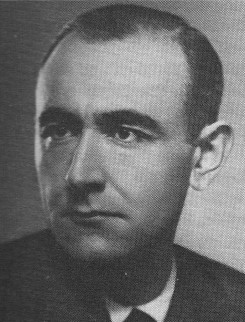Mokka, Hans
Banat Writer, Printer, Actor, Singer, Poet & Author

Born 12 May 1912 Temeswar, lives in Temeswar. (Pseudonyms: Peter Andres, Christian Schwärmer) printer, actor, singer, lyric poet and writer of prose, translator; member of the Writers’ Association of the RSS; Prize of the newspaper Neuer Weg 1953. (Schneider, Eduard – DVHH Banat)
Hans Mokka grew up in Rosengasse in the Iosefin district of Timișoara. By 1926, he attended the Piaristengymnasium. Then he began a printer apprenticeship and during this time he founded a literary circle for young book authors. In the late 1930s he became a publisher until 1944. Mocha took violin lessons at the Béla Tomm in Timisoara and then baritone training in Munich. His first performances of operas and operettas found an inclined audience to a theater front during World War II. Mokka fell into Soviet captivity for 6 months and then returned to Timișoara in 1947 and married the pianist and poet Irene Mokka in 1948. In Timisoara he was an actor in 1956 and an opera singer from 1957 to 1968 at the German State Theater in Timisoara. Between 1956 and 1968 he worked in the Sibiu Bach Choir as a soloist. After the death of his wife Irene in 1973 Hans worked with musical events in churches in Timisoara and popular culture events.
As a poet, Hans Mokka expressed himself first in Hungarian, then in German verse. He published his first poems in a school newspaper in 1928. In 1938 and 1939 his first volumes of poems appeared as private print. After 1948 he wrote not only his publications in the “Temesvarer Zeitung” but also in many German-language periodicals in Romania as well as in the Hungarian newspapers Utunk, Igaz Szó, A Hét, and Előre. During the period of Stalinism, he published numerous “proletkultistische texts” and later some “didaktizistische youth books”. Mokka was a co-author of the anthologies “Peace and Development” (1950), “German poet of the RVR (Romanian People’s Republic)” (1953), “German narrator of the RVR” (1955). His “Experiences in the Soviet Union” appeared in the latter volume. This also includes the prose piece “The Broken Hammer Handle.” In 1971, Mokka’s patriotic texts appeared in the Romanian propaganda anthology “Înfrăţiţi slăvim partidul” (German brothers we praise the party). In the 1960s, he published among others in Germany and Austria. In 1991, Mokka emigrated to Germany and settled in Darmstadt.
Author of:
- Stille Jugendtage [Quiet days of youth], poems, 1938
- Improvisationen [Improvisations], poems, 1941
- Die Hahnenfeder [The rooster’s feather], book for youth, 1967
- Das Traumboot [The dreamboat], book for youth, 1971
- Erlebtes Temeswar Alttemeswarer Mosaik; Published in 1992, Elwert (Marburg) Series: Schriftenreihe der Kommission für Ostdeutsche Volkskunde in der Deutschen Gesellschaft für Volkskunde e.V.; Bd. 60; 144 p.; ISBN 10:3770809947; LCCN:93169484
- Das unerwartete Geschenk. Anekdoten. Bukarest: 1987. 720 S. (12:21) Kart. — *1912 in Temeschburg
- Innere Landschaft. Gedichte. Bukarest: 1985. 110 S. (13:19) Kart. — *1912 in Temeschburg.
- Traumhansl und Traumlieschen. Märchen und Volkserzählungen aus Temeswar. 1985. 183 S. (10:20) Kart
Co-author of:
- Friede and Aufbau, Anthology, 1950
- Deutsche Dichter der RVR [German poets of the RPR], anthology, 1953
- Deutsche Erzähler der RVR, 1955
- Das Lied der Unterdrückten [The song of the oppressed], 1963 Lirica Timisoreana, 1970
- Monumentul iubirii [The monument of love], 1971
 Infratiti slavim partidul [As brothers we praise the party], 1971
Infratiti slavim partidul [As brothers we praise the party], 1971 - Jahrbuch deutscher Dichtung [Yearbook of German poetry], 1978
Source: Banater deutsche Autoren der Gegenwart 1980 von Edward Schneider, NBZ –Volkskalender 1980 Banat-German Authors of the Present – A bio-bibliographic list by Eduard Schneider. Bio information translated by Nick Tullius; contributed and published by Jody McKim 10 Nov 2009.
Last updated: 07/23/2025
